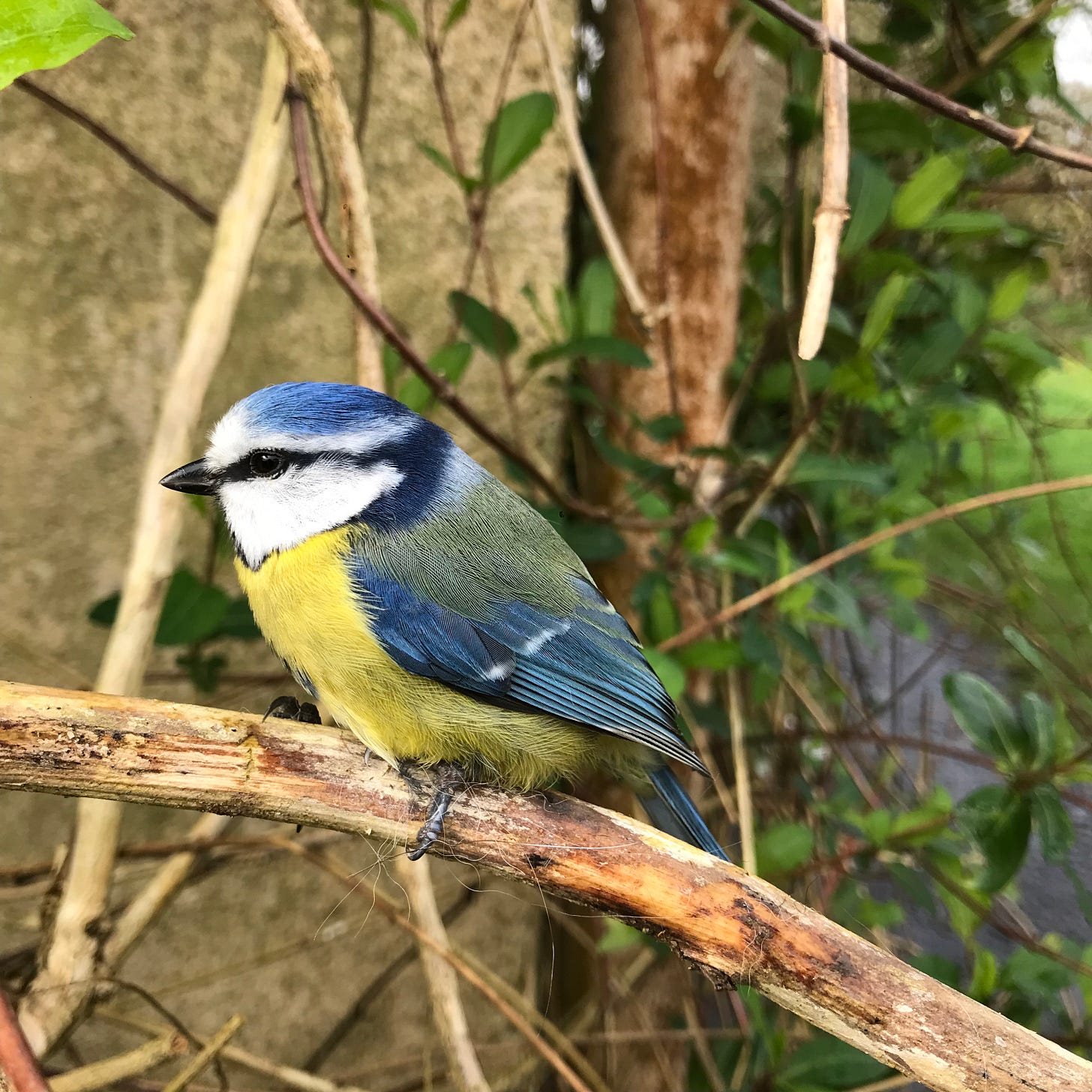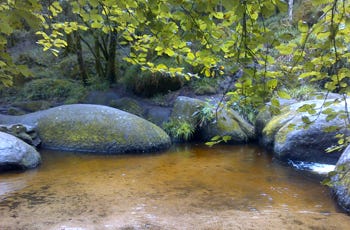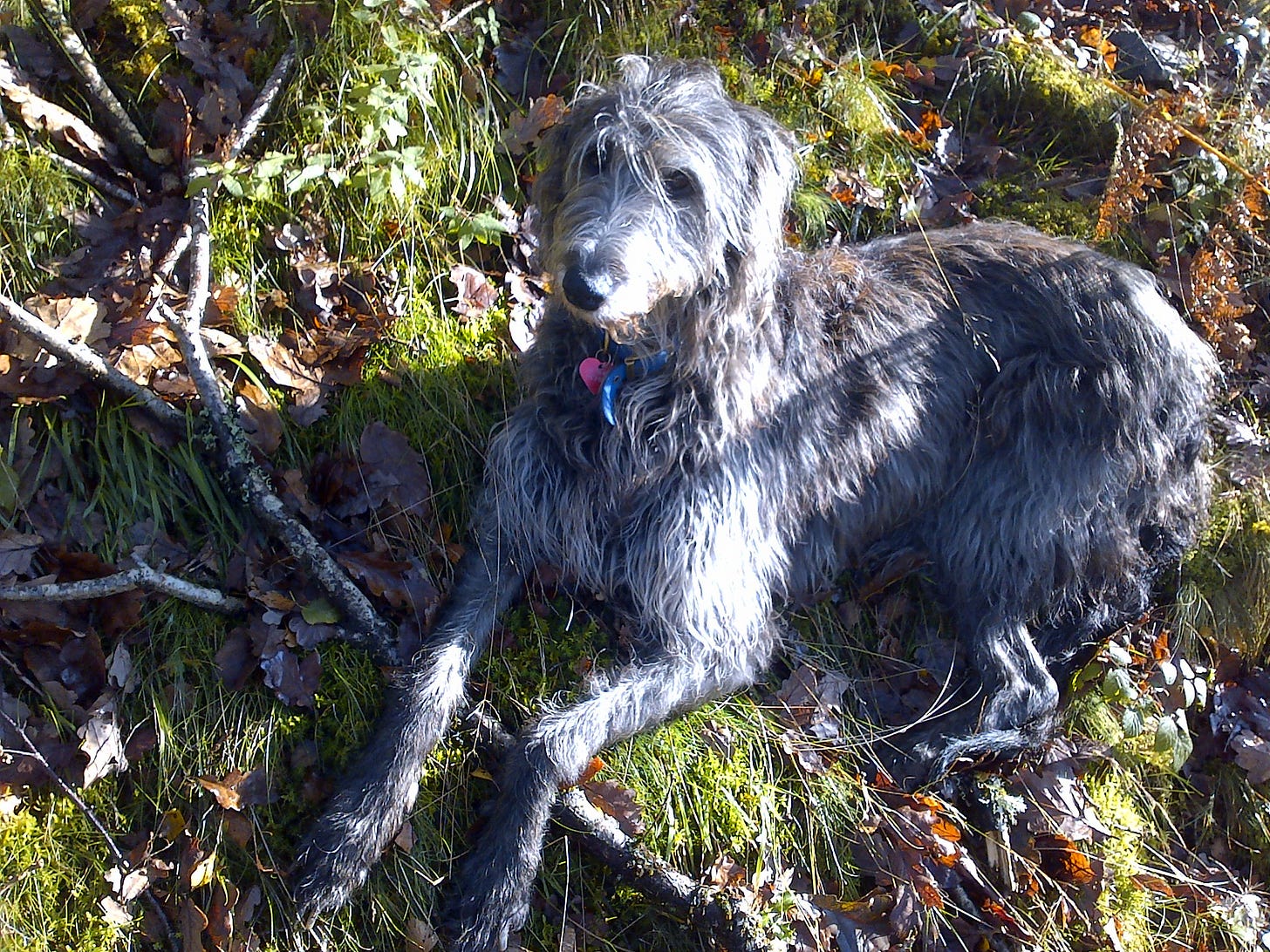bluetit family carefully delightedly eat my peach blossom
Now, as the trees start to blossom, even more birds move in, about which I’m very happy. Warblers. Families of greenfinches and goldfinches and a couple of hawfinches join the chaffinches; woodpeckers, both green and greater spotted, are in evidence – did you know that the spotted ones have an almost-under-their-breath intimate little chatter for pillow-talk?
Last year’s three crows harry the resident pair of buzzards at every possible opportunity. Just now the latter were quietly minding their own business, surfing a thermal, along with one of the sparrowhawks, when the crows came in loudly, like something from a folk tale or folk song.
The magpies have built a nest at the very top of the tallest oak in the heart of our patch. I can’t help but be fond of magpies, in their cheeky multi-voiced intelligence, but I fear, of course, for the many songbird chicks being raised here on which they will prey.
There are a couple of thrushes and a number of blackbirds. All European blackbird hens are brown, sometimes tinged a little auburn especially when young; but the lineage here is particularly rufous and speckled. One last year’s red blackbird hen is rearing chicks, and races manically around the meadow from first light, gathering worms.
The lake? A pair of swans at the far end. The cormorant population of about 18 birds has reduced to one or two. Yesterday, there was a great crested grebe.
People
I realise I don’t write much about people here. My human relationships are hugely important to me, but as a sensitive introvert (who often acts like an extravert), I need the other-than-human around me on a constant basis. The noisiest of animal/bird interactions still conveys a sense of deep silence being, as it is, non-verbal. This is how I recuperate and re-energise myself. All my adult life I’ve lived in fairly remote places, and it suits both me and TM that we live in a spot secluded from human activity.
But when the proprietors of our favourite café tell us they’ve sold it, I realise how very significant such points of reference, if one can describe humans in that way: such touchstones – are. (Our ‘social life’ consists partly in the market on a Thursday, very well supplied by small organic growers, followed by a coffee and in summer a crêpe: ‘krampouezenn’.)
I have told the story of my arriving here in this area, in the beautiful Forêt de Huelgoat in Finistère, this most northwesterly department edged by the Atlantic, first in early 1988, then more permanently in 2015, in my Spell in the Forest book so I won’t recap that here, except to say I have an ancient sense of belonging here. (I’ve spoken of that in this blog, too.)
In the very first article I wrote on this In the Beautiful Middles of Nowhere Substack, the story of how we arrived here, ultimately as a result of my broken arm, to do what we’re doing, I wrote:
[Brittany is also] ‘…the land of the stone circles and the other megaliths of my people from the Far West of Cornwall; and Brittany hosts one of the densest number of megalithic sites anywhere in the world. Brittany, particularly the forest towards which we’re driving, for decades now has offered me a deep sense of belonging.
‘We enter the misty drizzle that so often characterises this land at the edge of the world, and despite the pain in my arm something lifts away from me and dissolves in the mists.
[…] ‘It’s hard to give up the dream of the romantic south or southwest of France, in or near mountains: ancient golden-stone houses with red pantile roofs; sun and more sun; eating outside every evening; but we did. Little by little we reoriented our vision until it became obvious that we would be looking to move to misty, magical, mythical, damp, grey-stone, slate-roofed Brittany after all.’
When I was in my early 20s I lived for a while in the French Pyrenees, in Ariège; stunningly beautiful, and the site of some bizarre ‘out-of-body’ experiences that appeared to send me back in time to the 13th century, and the persecution of the Cathars (a story I fictionalise in my first novel Imago). Although I’m still drawn to that area, I’m aware too that they’ve been on drought alert, despite some heavy storms and flooding, since 2023. So when it came to it, I was too anxious about what the south now means: increasing drought, increasing water stress (but also tremendous floods on the occasion of heavy rains), and for me the environmental costs of flying or driving back so far to see family and friends in Britain’s Westcountry. Here in the north we know of quite a few people who’ve migrated up here from the south because of the increasing drought conditions.
So here we are. When I first came over a few times a year on my own on the Plymouth>Roscoff ferry, I loved that the back roads meant that I wove through forest for the last 15 or so miles, and barely met another car (I still almost never do). My destination was a couple of miles outside Huelgoat, and I’d stop in the town by the lake to have a coffee in a bar right by the entrance into the woods. This was my ‘arriving’ ritual. The proprietors, Pascal and Mireille, have always been friendly and welcoming, and we have come to know each other. (We also share a love of Arab horses, of which they live with a few. What’s more, they make the only decent coffee for miles.)
So yesterday, they told me they were selling up. I don’t mind change, but I was unsettled by their news nonetheless; my trips out here for several years were a way of navigating difficult and somewhat traumatising times in my personal life. This reminds me of the wonderful Sylvie, the estate agent who negotiated so beautifully our house purchase, and always went the extra mile, as they say, to let us know about houses that matched our wishlist, and in negotiating the sale price downwards. She closed her business last year, and we miss her presence in town still, even though we don’t need her professional input.
The third person, or people, who have been such an anchor for me here, are Alain and Christian of the local garage. In the days before we lived here and I came out alone, I drove an ancient VW T4 campervan, and brought my huge old deerhound, Ash.
As we arrived one day from the ferry my campervan lost its clutch on the bridge by the café. I coasted in 2nd gear to the garage. I’d bought diesel there once or twice but they didn’t know me. I had another couple of miles to go and the old dog wouldn’t make it on foot, plus I had a load of gear to carry. Sizing up the situation and without any hesitation, Christian lent me a Peugeot until he’d been able to fix my van. Bearing in mind that he knew nothing about me or where to find me, that’s kindness.
I hadn’t realised just how very important these connections are to me.
And one thing I swore we wouldn’t do was to hang out in the ex-pat community. I wanted to integrate properly. We do have some French and some Breton friends, but I’m very grateful for the British people I know.
Including our neighbours. P and T live about a quarter of a mile away and are our closest neighbours. They moved over here years ago, also from the Westcountry. In normal circumstances, our paths wouldn’t cross: we have little in common in terms of our interests and ideologies, politically, environmentally or philosophically. And I discover how important good neighbours are, and how little, in some ways, shared vision might be relevant. What we do share is a deep love of the countryside, plants, and animals. And we laugh a lot.
One day a couple of years ago, for the beginning of our veg plot, we’d had 14 tons of municipal green waste compost unloaded by the gate – quite a distance from the garden, and we – mainly TM – would be barrowing it. The next afternoon, T and P turned up with a bottle of fizz, and a ‘proposition’. The first thing was a treat; the second word made me a little wary.
Their proposition? That they would bring down their dumper and loader and move our compost to where it was needed. For free. For kindness. That’s an act of neighbourliness that nearly had me in tears.
What good people there are still in the world.







Cheeky smart magpies,
chill thermal-surfing buzzards,
pillow-talking birds!
...
Humans as touchstones.
Some good people grow on us,
we miss them when gone.
The genuine kindness of the human spirit is what moves us isn’t it. Love reading your blog and to say I’m doing 5 rhythms dance in Kew and guess who walked in , lovely Alix Hearn who came on the writing retreat in the Cevenne 9 years ago